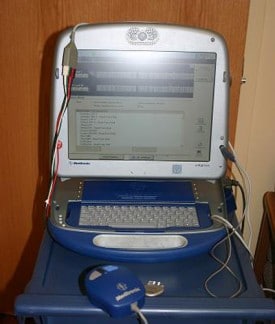What is our Pacer Clinic?
At Summit Healthcare Pacemaker Clinic, specially trained registered nurses and physicians provide education and ongoing care for patients who have a pacemaker or ICD. Summit Healthcare provides a full-service state-of-the art Pacer Clinic for patients.
Summit Healthcare’s Pacer Clinic meets the needs of the community with pacemaker and ICD needs, including implantation, battery changes, lead revisions and interrogations.
During the follow-up visits, the pacemaker’s functions and battery levels are checked and if needed, the pacemaker settings can also be adjusted.
Interrogating the pacemaker will identify a pacemaker’s malfunction early on and all the staff have the ability to optimize the pacemaker settings to best meet the needs of the patient while maximizing the life of the pacemaker battery. For more information about Summit Healthcare’s Pacer Clinic or our team of specialists call us at 928.537.6901.
How often should I visit the Pacer Clinic?
After your initial pacemaker implantation, we should see you in the Pacer Clinic in six weeks. From there, your pacemaker should be checked in the Pacer Clinic every three to six months. Your Summit Healthcare cardiologist will give you the frequency he or she feels is appropriate after that first checkup.

Is there anything I need to do to care for my pacemaker?
There isn’t any special care for your pacemaker. Just be sure you understand your pacemaker’s programmed lower and upper heart rate levels.
After implantation, it will take about eight weeks for your pacemaker to settle firmly into its position. Until that point, try to avoid sudden movements that would cause your arm to pull away from your body.
Try not to place pressure on the incision above the pacemaker. Women should wear a small pad over the incision to protect it from their bra strap.
Are there special precautions I need to take by having a pacemaker?
Modern pacemakers have come a long way from the early versions, which were subject to electrical interference. Today, it is unlikely your pacemaker would stop working because of this type of interference, but a few precautions are a good idea:
Cellphone Use
It’s safe to talk on a cellphone but keep it at least 6 inches away from your pacemaker. Don’t keep your phone in a shirt pocket. When talking on your phone, hold it to the ear opposite the side your pacemaker was implanted.
Security Systems
It’s completely safe to walk through security system equipment, but the metal in your pacemaker will likely set off the alarm. Avoid lingering or leaning against a metal detection system. It’s wise to inform the TSA agent at the airport or personnel doing the screenings elsewhere that you have a pacemaker.
Medical Equipment
Make sure all of your doctors and dentists know you have a pacemaker. Certain medical procedures/tests, such as magnetic resonance imaging, CT scans, cancer radiation treatment, electrocautery to control bleeding during surgery, and shock wave lithotripsy to break up large kidney stones or gallstones could interfere with your pacemaker.
Power-Generating Equipment
Stand at least two feet apart from welding equipment, high-voltage transformers, or motor-generator systems. If you work around such equipment, your pacemaker should be tested in your workplace to determine if it affects your pacemaker.
Other electric equipment that may have been problematic to earlier generations of pacemakers — microwave ovens, televisions and remotes, radios, toasters, electric blankets, electric shavers, and electric drills — should not pose any interference problems with your modern pacemaker.
How often do pacemakers need to be replaced?
Pacemakers need to be replaced when the lithium batteries begin to run down. This can take anywhere from 5 to 10 years depending on the frequency your body uses the pacemaker to elevate your heart rhythm. Rather than simply replacing the batteries, the entire pulse generator is replaced. The leads attached to your heart are not replaced.
How will I know if my pacemaker needs adjustment?
Adjustments to your upper and lower heart rate levels are made at the time your pacemaker is implanted, and they are checked again at that first checkup at the six-week mark.
From there, adjustments are not usually necessary, but a pacemaker can fail. When a pacemaker begins to falter, it may need to be reprogrammed. These are signs that could be happening:
- Frequent hiccups that are difficult to control
- Fast or slow heart rate
- Heart palpitations
- Muscle twitching in abdomen or chest on a fairly constant basis
- Lightheadedness
- Dizziness
- Difficulty breathing
- Loss of consciousness
- Fainting
Schedule Your Pacer Clinic Visit Today!
For more information about Summit Healthcare’s Pacer Clinic or our team of specialists call us at 928.537.6901. Summit Healthcare is proud to offer a wide variety of treatment options and care techniques for patients in Show Low, Pinetop, Lakeside and the surrounding areas in Arizona.


